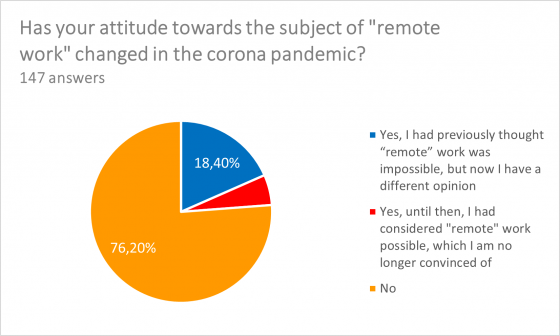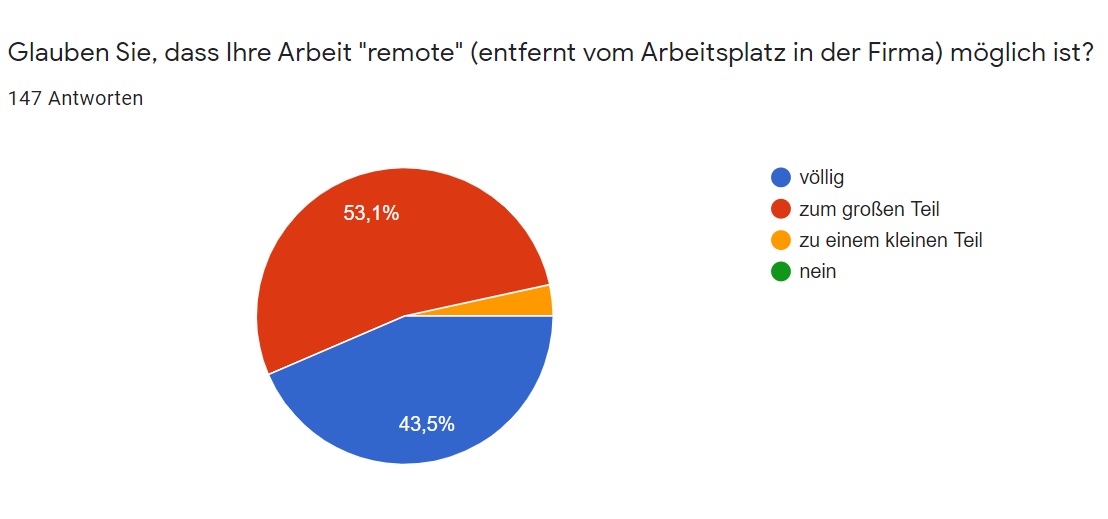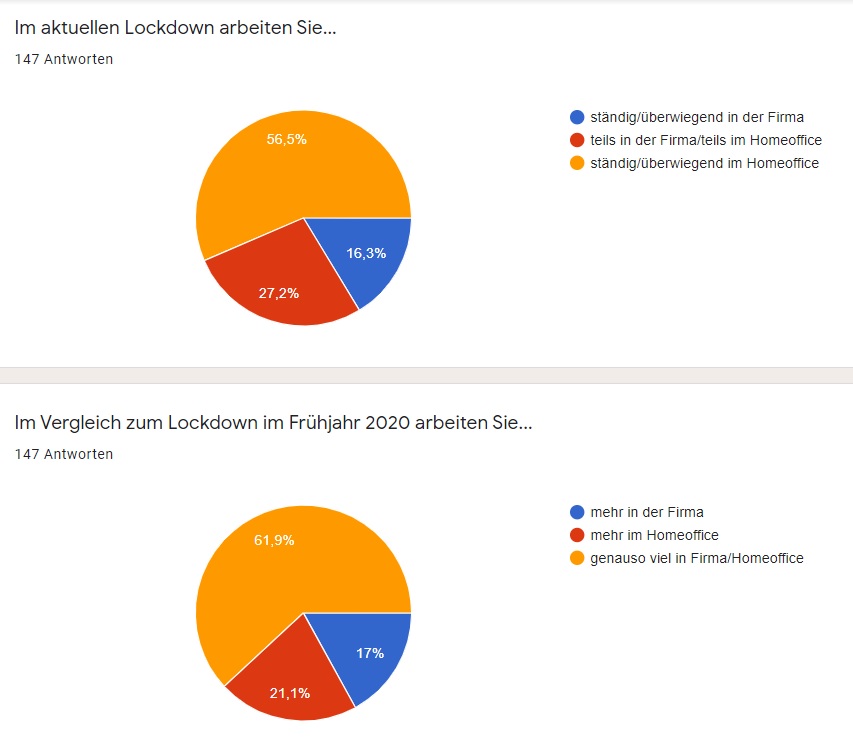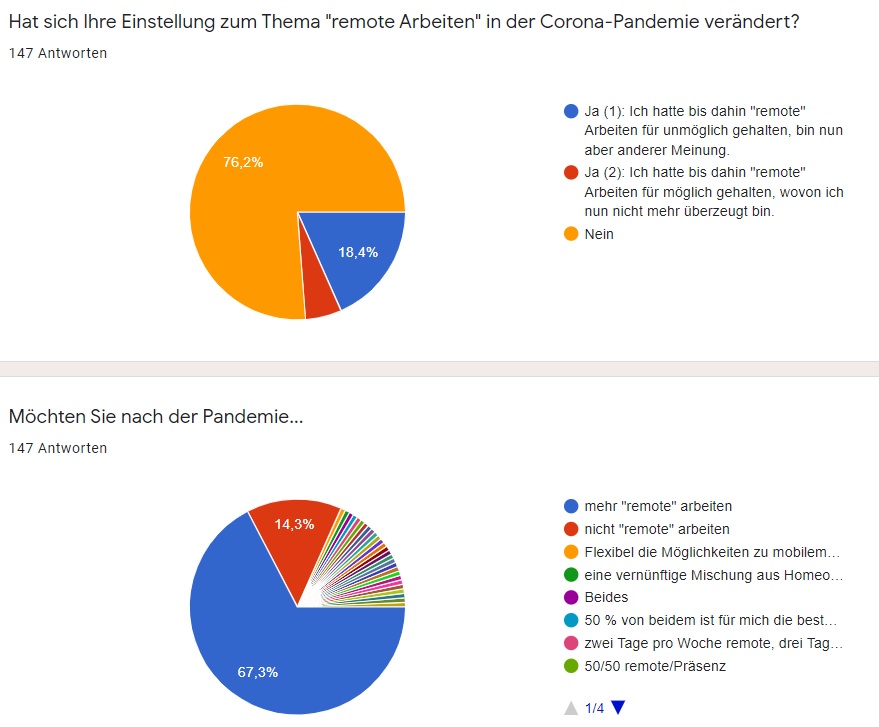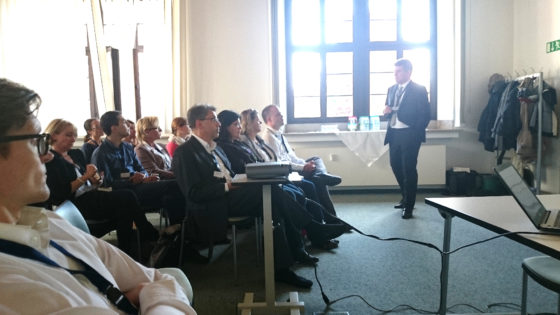ControllerInnen halten ihre Arbeit für Homeoffice-tauglich: Das hat eine Blitzumfrage des ICV International Association of Controllers im Januar ergeben. Anlässlich aktueller Debatten um mehr Homeoffice zur Kontaktreduzierung fragte der ICV-Fachkreis „Future of Work“, wie ControllerInnen diese Form von remote work – entfernt vom Arbeitsplatz in der Firma – nutzen.
56,5% gaben an, aktuell „ständig/überwiegend“ im Homeoffice zu arbeiten, 27,2% „teils in der Firma/teils im Homeoffice“ und 16,3% „ständig/überwiegend in der Firma“.
Ob ControllerInnen im Vergleich zum ersten Lockdown im Frühjahr 2020 nun im Januar 2021 mehr im Homeoffice oder mehr in der Firma arbeiten, war das Kernthema der Blitzumfrage. 61,9% gaben an, genauso viel in Firma bzw. Homeoffice zu arbeiten, wie beim ersten Lockdown, 17% „mehr in der Firma“ und etwas mehr, 21,1%, gaben an, diesmal mehr im Homeoffice zu arbeiten.
Stellt man diese marginale Steigerung der Homeoffice-Arbeit gegenüber dem Lockdown im Frühjahr 2020 und die genannten 16,3% „ständig/überwiegend in der Firma“ arbeitender ControllerInnen in den Zusammenhang mit einer anderen Aussage, wird Gesprächs- und Handlungsbedarf deutlich: Nur 5% glauben nämlich nicht an die Möglichkeit ihre Tätigkeit im Homeoffice ausführen zu können. Diese 5% gaben an, dass ihre Arbeit „zu einem kleinen Teil“ und kein Umfrageteilnehmer (0%), dass diese Arbeit gar nicht „remote“ möglich ist. Hingegen glauben 43,5%, dass dies „völlig“ und weitere 53,1%, dass es „zum großen Teil“ möglich ist: 96,6% gesamt. – (Ergänzung durch den Autor, 26.01./15:25 Uhr:) Die Differenz verdeutlicht, dass noch mehr Kontaktreduzierungen durch noch mehr Verlagerung der Arbeit ins Homeoffice möglich wären.
In der Blitzumfrage sollte ein Stimmungsbild gewonnen werden, ob sich die Einstellung der ControllerInnen zum Thema „remote arbeiten“ in der Corona-Pandemie verändert hat. Während 76,2% keine Einstellungsänderung angaben, nannten 18,1% eine gewachsene Zustimmung. Sie hatten die Antwort, „Ja (1): Ich hatte bis dahin “remote” Arbeiten für unmöglich gehalten, bin nun aber anderer Meinung“, angekreuzt. Das Gegenteil gaben 5,4% an: „Ja (2): Ich hatte bis dahin “remote” Arbeiten für möglich gehalten, wovon ich nun nicht mehr überzeugt bin“.
Die Beantwortung der abschließenden Frage mit Blick in die Zukunft nutzte eine ganze Reihe von Teilnehmenden für relativierende Anmerkungen. Ob man nach der Pandemie mehr im Homeoffice oder weniger dort arbeiten will, konnte mit einer dritten, offenen Möglichkeit beantwortet werden. Während 67,3% „mehr remote“ und 14,3% „weniger remote“ arbeiten wollen, hatten sich 17,4% für eine offene Antwort entschieden. In großer Mehrheit sprachen sie sich für flexible Wahlmöglichkeiten, eine „vernünftige Mischung aus Homeoffice und Anwesenheit in der Firma“ aus. Teilweise wurde eine konkrete Aufteilung der Arbeitswoche in Präsenz- und in Homeoffice-Tage, z.B. 3 zu 2, angegeben.
Auch wurden Thesen wie, Kreativ-Meetings, die Beziehungspflege, das von Controllern benötigte Feedback der Kollegen außerhalb des Controllings zu bekommen, sei seien „keine Online-Themen“, aufgestellt. Diese herausfordernden Fragen sind mit Sicherheit zu klären. Im ICV arbeitet der Fachkreis „Future of Work“ daran, der bevorstehende 45. Congress der Controller (26./27. April, Hybrid-Veranstaltung) wird ein Themenzentrum „Future of Work im Controlling“ bieten.
Für den Moment ist für mich eine Antwort unumstritten: „Immer dann, wenn remote notwendig ist, ist es zu nutzen.“
Controllers consider their work to be suitable for home office: That was the result of a quick poll by the ICV International Association of Controllers in January. On the occasion of current debates about implementing home office to reduce contact, the ICV expert work group “Future of Work” asked how controllers use this form of remote work – away from the workplace in the company.
56.5% stated that they currently work “constantly / mainly” in home office, 27.2% “partly in the company / partly in home office” and 16.3% “constantly / mainly in the company”.
The main topic of the quick survey was whether controllers work more in home office or more in the company in January 2021, compared to the first lockdown in spring 2020. 61.9% stated that they have worked just as much in the company or home office as during the first lockdown, 17% “more in the company” and a little more, 21.1%, stated that they have worked more in home office this time.
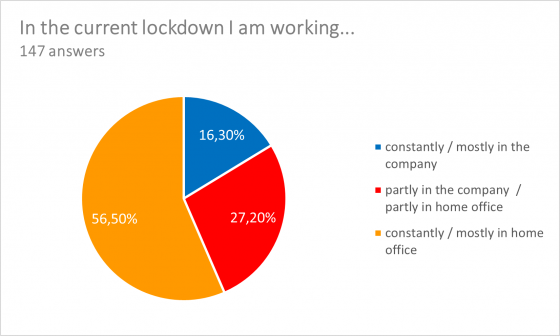
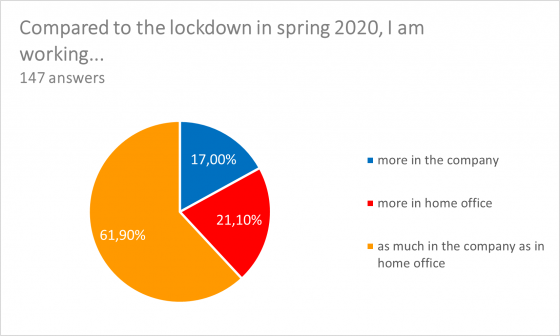
If you compare this marginal increase in home office work to the lockdown in spring 2020 and the mentioned 16.3% controllers “constantly / predominantly in the company” to another statement, the need for discussion and action becomes clear: Only 5% do not believe in the possibility of doing their work in home office. These 5% stated that their work can be remote “to a small extent” and no respondent (0%) stated that this work was not possible “remotely” at all. In contrast, 43.5% believe that this is “completely” and a further 53.1% that it is “largely” possible: 96.6% overall. – (Supplement by the author, January 26th / 3:25 pm :) The difference makes it clear that even more contact reductions would be possible by moving more work to home office.
The quick survey was intended to provide a picture of whether the attitudes of controllers on the subject of “remote work” has changed in the corona pandemic. While 76.2% indicated no change in attitude, 18.1% showed a higher level of approval. They chose the answer, “Yes (1): I had previously thought “remote” work was impossible, but now I have a different opinion”. The opposite was stated by 5.4%: “Yes (2): Until then, I had considered “remote” work possible, which I am no longer convinced of”.
A number of participants used the answer to the final question about the future to make relativistic comments. Whether you want to work more in home office or less there after the pandemic could be answered with a third, open option. While 67.3% want to work “more remote” and 14.3% “less remote”, 17.4% opted for an open answer. The vast majority of them were in favor of flexible options, a “sensible mix of home office and company presence”. In some cases, a specific division of the working week into attendance and home office days, e.g. 3 to 2, was specified.
Theses such as that creative meetings, maintaining relationships, getting the feedback required by controllers from colleagues outside of controlling are “not online topics” were also put forward. These challenging questions are to be answered with certainty. In the ICV, the “Future of Work” expert work group is working on this, and the upcoming 45th Congress of Controllers (April 26/27, hybrid event) will offer a “Future of Work in Controlling” topic cluster.
